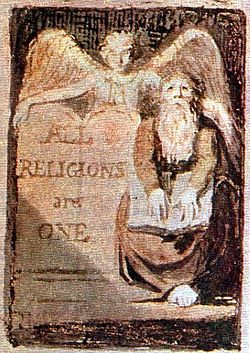
Back فلسفة خالدة Arabic Filsafat perenial BJN Filosofia perenne Catalan Philosophia perennis Czech Philosophia perennis Danish Philosophia perennis German Filosofía perenne Spanish خرد جاویدان FA Philosophia perennis Finnish Philosophie éternelle French
| Part of a series on |
| Spirituality |
|---|
| Outline |
| Influences |
| Research |
The perennial philosophy (Latin: philosophia perennis),[note 1] also referred to as perennialism and perennial wisdom, is a school of thought in philosophy and spirituality that posits that the recurrence of common themes across world religions illuminates universal truths about the nature of reality, humanity, ethics, and consciousness. Some perennialists emphasize common themes in religious experiences and mystical traditions across time and cultures; others argue that religious traditions share a single metaphysical truth or origin from which all esoteric and exoteric knowledge and doctrine have developed.

Perennialism has its roots in the Renaissance era-interest in neo-Platonism and its idea of the One from which all existence emerges. Marsilio Ficino (1433–1499) sought to integrate Hermeticism with Greek and Christian thought,[1] discerning a prisca theologia found in all ages.[2] Giovanni Pico della Mirandola (1463–1494) suggested that truth could be found in many—rather than just two[which?]—traditions. He proposed a harmony between the thought of Plato and Aristotle and saw aspects of the prisca theologia in Averroes (Ibn Rushd), the Quran, Kabbalah, and other sources.[3] Agostino Steuco (1497–1548) coined the term philosophia perennis.[4]
Developments in the 19th and 20th centuries integrated Eastern religions and universalism—the idea that all religions, underneath apparent differences, point to the same Truth. In the early 19th century, the Transcendentalists propagated the idea of a metaphysical Truth and universalism—this inspired the Unitarians, who proselytized among Indian elites. Toward the end of the 19th century, the Theosophical Society further popularized universalism in the Western world and Western colonies. In the 20th century, this form of universalist perennialism was further popularized by Aldous Huxley and his book The Perennial Philosophy, which was inspired by Neo-Vedanta. Huxley and some other perennnialists grounded their point of view in the commonalities of mystical experience and generally accepted religious syncretism.
Also, in the 20th century, the anti-modern Traditionalist School emerged in contrast to the universalist approach to perennialism. Inspired by Advaita Vedanta, Sufism and 20th-century works critical of modernity such as René Guénon's The Crisis of the Modern World, Traditionalism emphasises a metaphysical unitary source of the major religions in their "orthodox" forms and rejects syncretism, scientism, and secularism as deviations from the truth contained in their concept of Tradition.
Cite error: There are <ref group=note> tags on this page, but the references will not show without a {{reflist|group=note}} template (see the help page).
- ^ Slavenburg & Glaudemans 1994, p. 395.
- ^ Schmitt 1966, p. 508.
- ^ Schmitt 1966, p. 513.
- ^ Schmitt 1966.